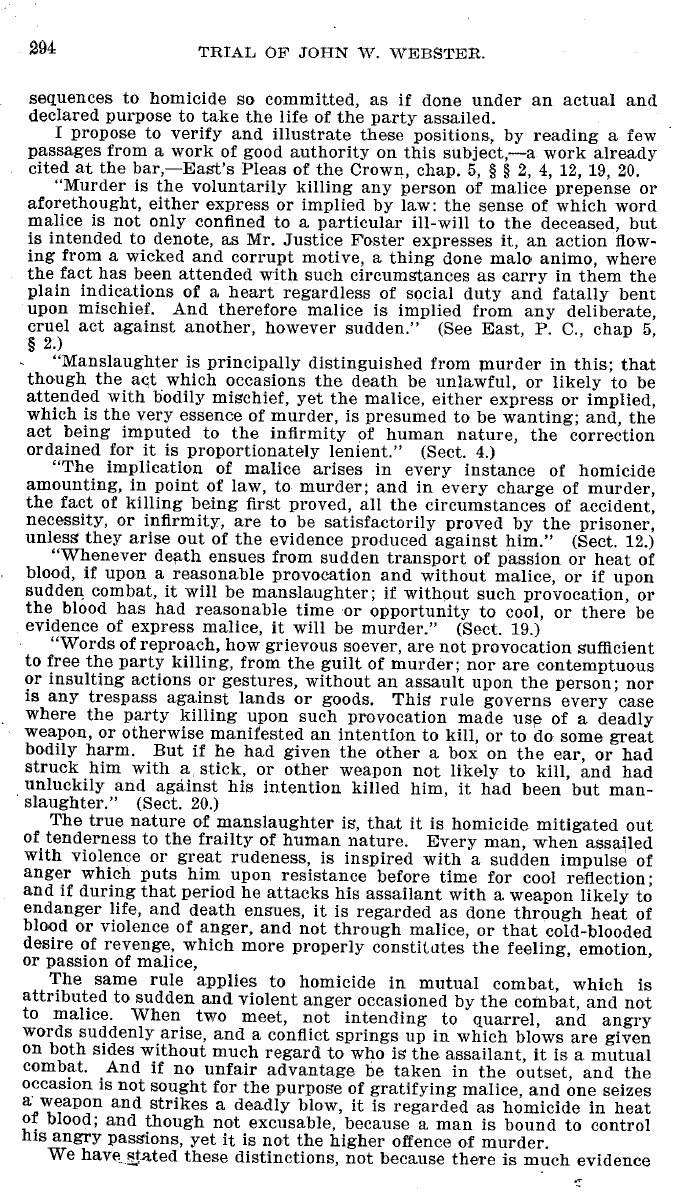|
204 TRIAL Oh` JOHN W. WEBSTER.
sequences to homicide so committed, as if done under an actual and
declared purpose to take the life of the party assailed.
I propose to verify and illustrate these positions, by reading a few
passages from a work of good authority on this subject, -a work already
cited at the bar,-East's Pleas of the Crown, chap. 5, § § 2, 4, 12, 19, 20.
"Murder is the voluntarily killing any person of malice prepense or
aforethought, either express or implied by law: the sense of which word
malice is not only confined to a particular ill-will to the deceased, but
is intended to denote, as Mr. Justice Foster expresses it, an action flow-
ing from a wicked and corrupt motive, a thing done males animo, where
the fact has been attended with such circumstances as carry in them the
plain indications of a, heart regardless of social duty and fatally bent
upon mischief. And therefore malice is implied from any deliberate,
cruel act against another, however sudden." (See East, P. C., chap 5,
§ 2.)
"Manslaughter is principally distinguished from murder in this; that
though the act which occasions the death be unlawful, or likely to be
attended with bodily mischief, yet the malice, either express or implied,
which is the very essence of murder, is presumed to be wanting; and, the
act being imputed to the infirmity of human nature, the correction
ordained for it is proportionately lenient." (Sect. 4.)
"The implication of malice arises in every instance of homicide
amounting, in point of law, to murder; and in every charge of murder,
the fact of killing being first proved, all the circumstances of accident,
necessity, or infirmity, are to be satisfactorily proved by the prisoner,
unless they arise out of the evidence produced against him." (Sect. 12.)
"Whenever death ensues from sudden transport of passion or heat of
blood, if upon a reasonable provocation and without malice, or if upon
sudden combat it will be manslaughter; if without such provocation, or
the blood has had reasonable time or opportunity to cool, or there be
evidence of express malice, it will be murder." (Sect. 19.)
"Words of reproach, how grievous soever, are not provocation sufficient
to free the party killing, from the guilt of murder; nor are contemptuous
or insulting actions or gestures, without an assault upon the person; nor
is any trespass against lands or goods. This rule governs every case
where the party killing upon such provocation made use of a deadly
weapon, or otherwise manifested an intention to kill, or to do some great
bodily harm. But if he had given the other a box on the ear, or had
struck him with a stick, or other weapon not likely to kill, and had
unluckily and against his intention killed him, it had been but man-
slaughter." (Sect. 20.)
The true nature of manslaughter is, that it is homicide mitigated out
of tenderness to the frailty of human nature. Every man, when assailed
with violence or great rudeness, is inspired with a sudden impulse of
anger which puts him upon resistance before time for cool reflection;
and if during that period he attacks his assailant with a weapon likely to
endanger life, and death ensues, it is regarded as done through heat of
blood or violence of anger, and not through malice, or that cold-blooded
desire of revenge, which more properly constitutes the feeling, emotion,
or passion of malice,
The same rule applies to homicide in mutual combat, which is
attributed to sudden and violent anger occasioned by the combat, and not
to malice. When two meet, not intending to quarrel, and angry
words suddenly arise and a conflict springs up in which blows are given
on both sides without much regard to who is the assailant, it is a mutual
combat. And if no unfair advantage be taken in the outset, and the
occasion is not sought for the purpose of gratifying malice, and one seizes
a weapon and strikes a deadly blow, it is regarded as homicide in heat
of blood; and though not excusable, because a man is bound to control
his angry passions., yet it is not the higher offence of murder.
We have stated these distinctions, not because there is much evidence
|

